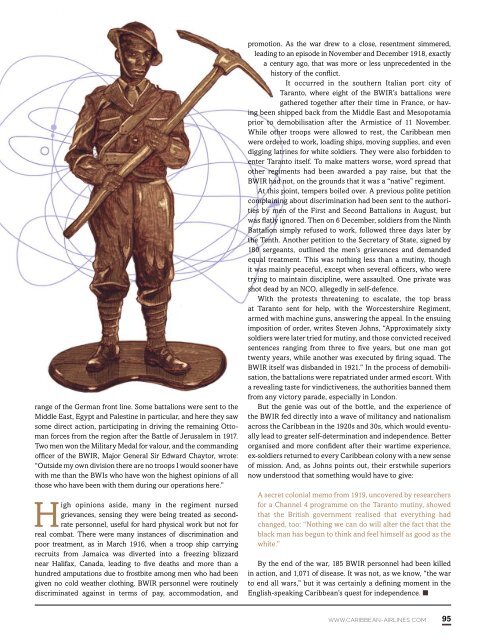Caribbean Beat — November/December 2018 (#154)
A calendar of events; music, film, and book reviews; travel features; people profiles, and much more.
A calendar of events; music, film, and book reviews; travel features; people profiles, and much more.
Create successful ePaper yourself
Turn your PDF publications into a flip-book with our unique Google optimized e-Paper software.
ange of the German front line. Some battalions were sent to the<br />
Middle East, Egypt and Palestine in particular, and here they saw<br />
some direct action, participating in driving the remaining Ottoman<br />
forces from the region after the Battle of Jerusalem in 1917.<br />
Two men won the Military Medal for valour, and the commanding<br />
officer of the BWIR, Major General Sir Edward Chaytor, wrote:<br />
“Outside my own division there are no troops I would sooner have<br />
with me than the BWIs who have won the highest opinions of all<br />
those who have been with them during our operations here.”<br />
High opinions aside, many in the regiment nursed<br />
grievances, sensing they were being treated as secondrate<br />
personnel, useful for hard physical work but not for<br />
real combat. There were many instances of discrimination and<br />
poor treatment, as in March 1916, when a troop ship carrying<br />
recruits from Jamaica was diverted into a freezing blizzard<br />
near Halifax, Canada, leading to five deaths and more than a<br />
hundred amputations due to frostbite among men who had been<br />
given no cold weather clothing. BWIR personnel were routinely<br />
discriminated against in terms of pay, accommodation, and<br />
promotion. As the war drew to a close, resentment simmered,<br />
leading to an episode in <strong>November</strong> and <strong>December</strong> 1918, exactly<br />
a century ago, that was more or less unprecedented in the<br />
history of the conflict.<br />
It occurred in the southern Italian port city of<br />
Taranto, where eight of the BWIR’s battalions were<br />
gathered together after their time in France, or having<br />
been shipped back from the Middle East and Mesopotamia<br />
prior to demobilisation after the Armistice of 11 <strong>November</strong>.<br />
While other troops were allowed to rest, the <strong>Caribbean</strong> men<br />
were ordered to work, loading ships, moving supplies, and even<br />
digging latrines for white soldiers. They were also forbidden to<br />
enter Taranto itself. To make matters worse, word spread that<br />
other regiments had been awarded a pay raise, but that the<br />
BWIR had not, on the grounds that it was a “native” regiment.<br />
At this point, tempers boiled over. A previous polite petition<br />
complaining about discrimination had been sent to the authorities<br />
by men of the First and Second Battalions in August, but<br />
was flatly ignored. Then on 6 <strong>December</strong>, soldiers from the Ninth<br />
Battalion simply refused to work, followed three days later by<br />
the Tenth. Another petition to the Secretary of State, signed by<br />
180 sergeants, outlined the men’s grievances and demanded<br />
equal treatment. This was nothing less than a mutiny, though<br />
it was mainly peaceful, except when several officers, who were<br />
trying to maintain discipline, were assaulted. One private was<br />
shot dead by an NCO, allegedly in self-defence.<br />
With the protests threatening to escalate, the top brass<br />
at Taranto sent for help, with the Worcestershire Regiment,<br />
armed with machine guns, answering the appeal. In the ensuing<br />
imposition of order, writes Steven Johns, “Approximately sixty<br />
soldiers were later tried for mutiny, and those convicted received<br />
sentences ranging from three to five years, but one man got<br />
twenty years, while another was executed by firing squad. The<br />
BWIR itself was disbanded in 1921.” In the process of demobilisation,<br />
the battalions were repatriated under armed escort. With<br />
a revealing taste for vindictiveness, the authorities banned them<br />
from any victory parade, especially in London.<br />
But the genie was out of the bottle, and the experience of<br />
the BWIR fed directly into a wave of militancy and nationalism<br />
across the <strong>Caribbean</strong> in the 1920s and 30s, which would eventually<br />
lead to greater self-determination and independence. Better<br />
organised and more confident after their wartime experience,<br />
ex-soldiers returned to every <strong>Caribbean</strong> colony with a new sense<br />
of mission. And, as Johns points out, their erstwhile superiors<br />
now understood that something would have to give:<br />
A secret colonial memo from 1919, uncovered by researchers<br />
for a Channel 4 programme on the Taranto mutiny, showed<br />
that the British government realised that everything had<br />
changed, too: “Nothing we can do will alter the fact that the<br />
black man has begun to think and feel himself as good as the<br />
white.”<br />
By the end of the war, 185 BWIR personnel had been killed<br />
in action, and 1,071 of disease. It was not, as we know, “the war<br />
to end all wars,” but it was certainly a defining moment in the<br />
English-speaking <strong>Caribbean</strong>’s quest for independence. n<br />
WWW.CARIBBEAN-AIRLINES.COM 95


















